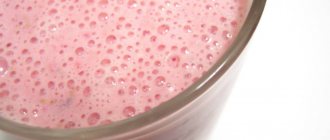Protein is a concentrated protein structure needed to increase muscle mass and physical strength. Due to its biological properties, the chemical is used to feed athletes and bodybuilders. By gaining weight through skeletal muscle, people increase their endurance during long-term physical training. At the same time, people wonder whether protein is harmful or not, because in pursuit of sculpted muscles it is easy to harm their health.
What is protein
The body receives protein through food containing protein. The latter, when it enters the gastrointestinal tract, is broken down and absorbed in molecular form into the blood. People ask what the benefits of protein are. In the body, it is converted into energy to power skeletal muscles and internal organs throughout the day, allowing you to lose excess weight. Protein reserves must be replenished daily. In this case, you need to consume 2.5 g of the nutrient per 1 kg of weight.
At the same time, nutritionists answer the question of whether protein is harmful.
Excessive protein consumption can lead to gastrointestinal disorders and disruption of the functioning of some internal organs.
General information
In 1990, protein was considered unhealthy, along with formula and energy drinks. Over time, attitudes towards it have changed, so people who are actively involved in sports do not neglect the regular consumption of protein powder.
65% of people consider protein to be a natural product that does not contain synthetic substances. In their opinion, protein is necessary for the proper functioning of organ systems and the nutrition of soft tissues, and therefore cannot cause harm. At the same time, such views remain erroneous - we must not forget that an excess of any natural or synthetic component creates additional stress on the organs. Especially concentrated protein contained in special protein shakes.
Classification of protein by type of raw material
Protein is a food mixture that is in demand by people, regardless of body weight, age and gender. The chemical was synthesized by breaking down the protein structure into casein and whey mixture. The latter is a complex of polypeptides and is easily absorbed by the body. Casein takes 2 times longer to digest, resulting in up to 40% of the substance being absorbed.
Protein powders are produced for making smoothies with the addition of natural yogurt or milk. Depending on the type of raw material used for preparation, food additives are divided into 2 main groups:
- Soy protein, consisting of plant polypeptides. The product contains lecithin, which slows down the natural aging processes of soft tissues.
- Whey Protein. The product is natural, if abused, a person develops migraines and vomiting.
Why is protein so important?
Protein is easily absorbed by the body and received with food from birth to death. Protein and its constituent amino acids are included in infant formula and are present in the structure of breast milk in the amount of 9-15 g per 100 ml of product. Polypeptides are extracted from meat, milk, egg whites and casein, so this protein does not belong to the category of synthetic additives.
The benefit of proteins lies in the construction of new cells and tissues. Under conditions of stress, physical strain or a sedentary lifestyle, the body's need for sugar and lipids decreases. At the same time, tissues require protein to increase resistance and rapid recovery. Therefore, it is recommended not only for athletes to consume protein mixtures.
Protein will help people fight obesity, depression, fatigue, or promote muscle gain.
How to choose the best protein?
Origin of the protein
Depending on their origin, there are several types of proteins, and one of them will definitely suit you. Whey protein is made from whey, so it contains a small amount of lactose. People with intolerance to it should avoid using it. Casein should also be treated with caution.
Plant protein made from peas, rice and millet has a high gluten content, which can cause allergic effects on the body. And yet, only 1% of the population suffers from gluten intolerance. For the development of such a disease there must be genetic prerequisites. People with gluten intolerance need to avoid eating not only plant protein, but also other grain products.
Information on the packaging
Read the label carefully. Manufacturers always indicate not only the energy value and protein composition, but also the presence of various components to which a person may be allergic.
Protein source
Many nutritionists note that taking soy protein is harmful to health. Soy has very high levels of phytoestrogens, a group of natural compounds similar to estradiol. In men, they can increase the level of female hormones, which will lead not only to a decrease in muscle mass, but also to female type obesity and gynecomastia. High levels of estrogen in a man's body can also reduce the amount of testosterone. However, protein shakes cannot be blamed for everything: regular consumption of beer drinks also leads to a similar result.
Product quality
As we know, protein is synthesized in the liver. Therefore, when taking protein, it bears the main burden. If a person is experiencing the initial stages of liver disease, then regular excessive consumption of protein (not necessarily from sports supplements) will negatively affect the functioning of the organ. You need to understand that low-quality protein can cause great harm to health. The sports nutrition market is filled with various products from unknown manufacturers who do not always adhere to production standards. Don't forget about unscrupulous sellers. The product can be stored in poor conditions: high humidity, elevated temperature, bright light.
The most common side effects that may occur from taking low-quality protein are:
- nausea and vomiting;
- flatulence;
- diarrhea;
- various allergic reactions;
- kidney dysfunction.
To prevent this from happening, always check the expiration dates and integrity of the packaging without leaving the checkout. Better yet, purchase the product from a reputable manufacturer.
Types of Protein Powder
To choose the right protein powder, you should know the individual characteristics of the body: the presence of concomitant diseases, types of allergies and their manifestations, food intolerances. The purpose of its use must be taken into account:
- weight gain due to muscle growth;
- weight loss;
- quick recovery after training;
- improvement in general condition.
The correct protein structure should be selected together with a nutritionist or fitness trainer.
Animal based powders
There are other types of protein with less pronounced effects on muscles:
- Meat. Synthesized from animal protein, it has a meaty flavor.
- Casein. Production is based on milk curdling. The product has a high content of animal protein, which is why it is absorbed slowly over 3-5 hours.
- Egg. Dried chicken egg white with a specific taste.
- Lactic. The nutritional supplement combines whey with casein. 80% of the product is absorbed slowly, 20% is absorbed within 3-4 hours.
- Wheat. The basis of production is the germ of the grain. The chemical composition corresponds to a soy additive.
To avoid harm to the body, you should consume protein along with healthy foods and exercise regularly.
Plant Based Protein Powders
Plant proteins are suitable for vegetarians because they contain a wide range of amino acids, fiber, polyunsaturated fatty acids and do not affect overall well-being. Not recommended for use by men.
NATURAL ALTERNATIVE
A protein shake doesn't have to be a jar of powder, a soy smoothie, or a banana shake. You can try different combinations of products and choose the composition for yourself, but the optimal base is considered to be egg whites, milk and low-fat cottage cheese. Athletes also like to add oatmeal or a handful of nuts to the blender for a muscle- and health-boosting drink.
Natural products that can be options for a protein snack include cheese, nuts and dried fruits, tofu, and hummus. Even if you feel absolutely healthy, we recommend alternating these snacks with protein supplements. Well, in order to choose a suitable nutrition plan, it is advisable to contact a nutritionist.
Author:
Valeriya Klippert
Benefits of Protein
The benefits of protein include complete nutrition of skeletal muscles and replenishment of the body's need for protein and amino acids. Proper use of this chemical can improve the bioavailability of vitamins and mineral compounds. Protein allows you to quickly get rid of excess fat and increases the effectiveness of physical training.
15 main benefits of protein
There are a number of positive qualities of the protein mixture:
- Fast weight gain due to increased muscle mass.
- Dulling of appetite for 3-4 hours.
- Can be used as a snack.
- The benefits of protein for men are due to increased physical strength and endurance.
- The daily protein requirement is quickly gained, which is necessary for vegetarians.
- Easy to use and prepare products.
- Nutritional supplements are 100% absorbed in the body and do not cause heaviness or abdominal pain.
- The level of insulin in the blood is normalized.
- Replenish amino acid reserves.
- There is no need to think about cooking food after a long workout to replenish energy costs.
- The powder is convenient to store and transport.
- Proteins can be selected depending on taste and smell.
- Products of natural origin practically do not cause intolerance.
- When used correctly, they are harmless to the body.
- The benefit of protein for women lies in the low consumption of carbohydrates and fats, which can cause an increase in body fat.
Possible side effects
Intolerance
Those who are allergic to milk may also be allergic to whey protein. In moderate doses, it usually does not cause side effects, but when taking very high doses, the following symptoms may occur: abdominal pain, loss of appetite, nausea, headache, fatigue.
Additionally, high doses of whey protein can also cause acne.
Bad breath
Eating a lot of protein can lead to bad breath, especially if you limit your carbohydrate intake. This may be partly because your body enters a metabolic state called ketosis. Ketones give off an unpleasant “fruity” odor.
Brushing and flossing will not get rid of the odor. To combat the odor, you can double your water intake, brush your teeth more often, and chew gum.
Constipation
High protein diets that limit carbohydrates tend to be low in fiber. Constipation may occur as a result of eating this way. Drink more water and add more fiber to your diet.
Protein and proper nutrition
Sports nutrition involves following the rules of a balanced diet, which should consist only of natural products. Protein foods exhibit the following positive properties:
- normalization of insulin production;
- acceleration of metabolic processes;
- cleansing the body of toxins;
- strengthening the immune system;
- improving the condition of nails, skin and hair structure.
According to doctors, you should eat 60% plant foods, 30% animal products and 10% grains. You can supplement your diet with nutritional supplements, but you should remember that synthetic proteins for muscle growth are more harmful than natural products.
Which protein should you choose? Which one is better for gaining weight and which one is better for losing weight?
Which protein is best to choose for gaining muscle mass?
or for weight loss? It is very important for us that you understand that there is no separate protein for muscle growth and a separate protein for weight loss - in essence, all proteins are universal. At the same time, depending on the goal, we can recommend those types of proteins that, according to their characteristics, will be of higher priority.
If we are talking about what kind of protein to take to gain weight, the most popular are whey and egg, as they have a balanced amino acid profile and good digestibility. That is, with them you will achieve your goal many times faster and more efficiently.
What protein is best to drink for weight loss?
In this case, both complex multiproteins and whey protein are suitable, however, first of all, you should choose casein, which, due to its slow absorption, suppresses the feeling of hunger for a long time. As a result, the number of calories consumed is reduced, appetite is dulled, weight loss occurs, and, importantly, not due to muscle loss, but due to the loss of the fatty component of our body.
Negative consequences of use
Many people are interested in how protein affects the body. The following negative consequences are identified:
- Concentrated protein causes gastrointestinal problems.
- Disturbance of metabolic processes. When using large amounts of protein, carbohydrate and fat metabolism is disrupted, which are also necessary for the normal functioning of internal organs and systems.
- Long-term abuse of nutritional supplements creates severe stress on the liver and kidneys. It is possible to develop fatty degeneration of organs and reduce their functional activity.
- The harm of protein, which is sold in the form of synthetic powders, lies in the content of various chemical components: dyes, preservatives and flavors.
When is protein really bad? 5 main disadvantages of protein
Protein is harmful in the following cases:
- protein allergy;
- intestinal dysbiosis;
- severe kidney damage;
- abuse of protein drugs.
There are 5 disadvantages of protein supplements:
- Protein provokes eating disorders. People with lactase deficiency are at risk.
- An overdose of products negatively affects the functioning of the kidneys and liver.
- The high protein powder contains no vitamins or minerals.
- High cost of natural nutritional supplements.
- Low taste.
Impact on the female body
Side effects for girls when using large amounts of protein include disruption of general metabolic processes. Abuse of proteins causes calcium retention and sodium leaching from soft tissues, which contributes to an increase in fat deposits and fluid stagnation in the body.
Concentrated mixtures can lead to hormonal imbalances that cause menstrual irregularities.
Impact on the male body
When asked whether protein is harmful to men’s health, doctors give a positive answer. However, polypeptides synthesized from animal food are not dangerous. Plant foods, on the contrary, contain large amounts of phytoestrogens. When these structures enter the body of men, they suppress the production of testosterone, causing hormonal imbalance. As a result, problems with erection and muscle gain begin.
Carcinogenic effect of protein intake
The growth of most types of malignant tumors does not depend on protein. Animal protein can only increase the risk of:
- laryngeal cancer;
- tumors of the digestive system;
- colon cancer.
How does protein work?
A sports protein supplement acts on the body in the same way as protein that comes to us from natural food.
However, protein shakes differ in some ways from organic protein products. Let's look at the main differences:
- The powders are ready for use and do not require special processing. It is enough to dilute them with water, milk or other liquid;
- Powders contain an optimal ratio of proteins, fats and carbohydrates;
- Protein has a high absorption rate because it is already presented in a split form.
A huge advantage of protein is the ability to consume it in liquid form. This allows you to avoid overloading the gastrointestinal tract. Heavy protein foods, such as chicken breast or pork, linger much longer in the stomach, which causes it to stretch. In addition, during digestion they release a large amount of breakdown products, which remain in the body for a long time and clog it.
Is it harmful to take protein at night?
Eating protein at night will not harm your overall metabolism if you take casein protein or other long-absorbing products. Multicomponent supplements are absorbed within 6-8 hours, filling the muscles with energy and amino acids. As a result, the products provide mass growth by increasing muscle size.
When consuming fast proteins - isolates that are absorbed in 5-10 minutes - metabolism is disrupted. They are suitable for use in the morning or as a snack.
Harm to teenagers
Protein for teenagers is allowed only in extreme cases for gaining weight by increasing muscle mass. This is necessary for weightlifting. This limitation is due to the fact that this age group has a high metabolic rate. Additionally, accelerating it with the help of nutritional supplements is not recommended to avoid health problems.
During increased physical activity, you should take casein or whey protein. The use of bars and special cocktails with low nutritional value is allowed.
What protein is best for a girl to drink for weight loss?
The best options for sports protein for weight loss are whey and casein. The regimen is calculated by the trainer based on personal preferences. Both products are animal based and highly digestible. They effectively burn fat and provide the body with the required amount of protein.
Whey protein is known for its high quality and affordable price. Includes the entire list of amino acids important for muscle growth. The effect appears an hour after use.
Casein has a complex structure and is consumed slowly within 5-7 hours. Great for professional athletes to continue muscle growth at night. Also effective for burning calories.
When choosing a cocktail for weight loss, you should consider:
- Natural and safe composition.
- Type of protein breakdown.
- Cooking method.
Facts about the dangers of protein
The main harm of protein is its negative effect on organs, these are:
- kidney dysfunction;
- tumor formation;
- the appearance of bone fragility;
- liver damage.
These statements are based on certain clinical studies. Thanks to experiments, doctors have found that with an increase in the amount of protein in the diet, the concentration of calcium in urine increases. This phenomenon means that the protein begins to leach the chemical element from tissues, including bones and teeth.
1 – is protein harmful to the kidneys?
The kidneys are the main organ through which protein metabolism products, toxins and other substances are eliminated from the body. In addition, the kidneys regulate the level of minerals in the blood: they remove excess trace elements in the urine or return them to the blood. With a sharp increase in protein in the diet, the structure of the organs of the urinary system begins to gradually collapse.
The kidneys maintain the acid-base balance, so regular changes in diet towards acidification can lead to the development of acidosis. When homeostasis is disturbed, the risk of developing urolithiasis, tumors, and calcium leaching increases.
How does protein affect the filtering function of the kidneys?
If you increase your protein intake throughout the day, your kidneys will be forced to excrete more waste products. Healthy organs are able to adapt to increased stress, so a person with enhanced filtration will not be in danger. At the same time, in the presence of acute or chronic kidney diseases, their functional activity decreases by 40-100%. When the amount of protein in the diet increases, their work is disrupted, which leads to a deterioration in the general condition.
It is possible to facilitate the elimination of metabolic products in conditions of moderate physical activity.
People with kidney disease should consult their doctor before including protein in their diet.
How protein affects the risk of kidney stones
Kidney stones are formed from salts that must leave the body in urine. These tumors form when urine becomes more concentrated. It contains more mineral compounds, which makes it easier to create solid crystals.
The risk of stone formation increases with insufficient water intake and abuse of protein foods. Due to the high amount of protein in the urine, the concentration of calcium increases by 40%, oxalates by 30% and uric acid by 2 times compared to the norm.
2 – is protein harmful to the liver?
The negative effect of protein on the liver was discovered during an experimental study in 1974, when the protein content in the diet of mice was increased by 35%. As a result, such a diet led to an increase in plasma concentration and activity of hepatic transaminases, which indicated a disruption of the organ’s functioning and the development of pathological processes.
Similar data were recorded when mice were fed a casein mixture containing 50% protein every 48 hours. The researchers concluded that the amount of protein in the diet should not be increased by 35-50%, so as not to harm the liver. Their theories were confirmed when 2 patients were hospitalized with severe right upper quadrant pain and hyperalbuminemia. Elevated liver enzyme levels were caused by overuse of protein powders.
3 – is protein bad for bones?
Excessive protein consumption leads to the development of acidosis or acidification of the body. To normalize the acid-base balance, the body tries to neutralize the increased amount of acids with the help of calcium. The chemical element obtained from food is not enough to eliminate acidosis. Therefore, calcium begins to be washed out of the bones. As a result, the integrity of the musculoskeletal system is compromised, which increases the risk of fractures, cracks and injuries.
When the acid-base balance is disturbed, the kidneys cannot return calcium back into the general bloodstream. The chemical element gradually leaves the body along with urine, which causes hypercalciuria.
Animal protein may be more harmful to bone health than plant protein
Amino acids containing sulfur form 75% of animal protein and 25% of plant protein. Therefore, when consuming meat, dairy or egg products, the risk of developing acidosis increases. If you increase protein consumption from 50 to 150 g, the level of calcium in urine increases by 2 times.
A similar effect is observed when 150 g of sulfur-containing amino acids are used in food against a background of low protein intake. Protein structures, which include sulfur ions, are included in high quantities in animal proteins. Therefore, they are considered more harmful than plant proteins.
Vegetables and fruits reduce acidity levels in the body.
Soy protein contains phytoestrogens that support strong bone structure.
Sports protein may be more harmful to bone health than natural protein
Natural sources of protein - meat, chicken eggs and dairy products - are high in phosphorus. This chemical element prevents the excretion of calcium from the body through urine. The opposite effect when consuming natural products can be obtained by artificially reducing the level of phosphorus in the blood.
At the same time, sports casein and other artificially synthesized nutritional supplements contain virtually no phosphorus, which could stop bone loss.
4-harm of too much protein
When consuming more than 200 g of protein per day or food consisting of 40% protein, intoxication of the body develops. Protein poisoning results in vomiting, diarrhea and other digestive system disorders. Therefore, the amount of protein in the diet should be less than 40% of the total calories. It is recommended not to exceed the limits of 15-25%.
If a nutrient is abused, the body is not able to create the necessary amount of urine to remove the products of its decomposition. As a result, protein residues accumulate in the blood, and the plasma concentration of amino acids and ammonia increases, causing a toxic effect on tissue. To prevent the development of negative effects, you should drink more water.
5 – protein and cancer
Cornell University professor Colin Campbell argues that the greatest danger to the body is casein, whey mixture and egg form of protein. In 80% of cases, the appearance of malignant neoplasms in the prostate gland, breast and intestinal tract is provoked by dietary habits, especially meat consumption. The mechanism of tumor development may be due to the following reasons:
- during heat treatment, heterocyclic amines or carcinogens are formed in meat;
- the product contains a large amount of saturated fats, which cause cancerous degeneration of cells;
- Pathogenic bacteria multiply in meat and, when they enter the digestive system, produce ammonia, a substance that causes chromosomal mutations.
Regular consumption of red meat increases the risk of developing colon cancer by 40%.
Is protein harmful or not, according to doctors?
Is protein harmful or not - the main questions asked to doctors. In general, experts have nothing against sports nutrition.
Protein is harmful to health only if the daily dosage is exceeded, and its use is also contraindicated. In order to get all the answers to your questions, it is advisable to consult a doctor who can warn and prevent the occurrence of negative consequences.
Also, some mistakenly believe that protein causes enormous harm to men , while confusing protein products with steroids. Protein is found in many foods consumed daily; it is a building material for muscles and bones. Eating a moderate amount of pure protein is not harmful to health, but you still shouldn’t forget about regular protein foods.
Whether protein is harmful to health , reviews from doctors will help you figure it out:
- Andrey Sergeev, nephrologist: for those who decide to work out in the gym with the goal of building muscle mass, protein is an excellent helper, as it replenishes the missing amount of protein and nutrients. In addition, I recommend using it for those who are overweight, but only in combination with physical activity. Rapid weight loss and a lack of protein lead to sagging and deterioration of the skin, but protein will not allow this to happen; on the contrary, it will help improve your appearance. But you can’t eat protein shakes alone; nutrition must be balanced and correct.
- Svetlana Makarova, sports consultant: I have seen rare cases where protein has a negative effect on kidney health if it is abused. Many people do not fully understand how protein works, mistakenly believing that frequent intake of protein shakes allows them to lose weight or build muscle mass without much effort. That’s why there can be negative reviews when an uninformed person takes a large amount of protein, but only gets poor health as a result.
- Tatyana Sergeeva, doctor: protein supplements from trusted manufacturers include protein and nutrients, which is safe for health. Protein is a dried product obtained from whey or milk, which indicates its naturalness. But in order to avoid negative consequences, it is necessary to strictly adhere to the dosage, neglect of which leads to a deterioration in well-being, as well as disruption of kidney function.
Read also: Fat burners for weight loss for men and women: types, beneficial properties, contraindications
Harm and benefits of protein supplements
Protein supplements exhibit the following positive qualities:
- help maintain physical fitness;
- accelerate metabolic processes;
- increase cellular regeneration and shorten the period of recovery of skeletal muscles after physical activity;
- make it possible to adhere to diet therapy during a busy work schedule;
- increase endurance;
- increase muscle mass, resistant to high loads.
At the same time, if you abuse high-protein mixtures, you can cause harm to the body, which manifests itself in the following negative reactions:
- the occurrence of allergies;
- development of acne, blackheads, rashes;
- bloating, flatulence, vomiting;
- increase in the thickness of subcutaneous fat;
- increased risk of developing diabetes;
- erectile dysfunction in men;
- leaching of calcium from bones.
When natural proteins are used correctly, there are no negative effects. Soy supplements are recommended only for women because they contain phytoestrogens. The latter repeat the structure of female sex hormones, which suppress the production of testosterone in men, resulting in temporary infertility.
Contraindications to the use of protein mixture
There are contraindications to the use of protein:
- kidney failure;
- bladder diseases;
- increased sensitivity of tissues to the structural components of the protein mixture;
- cardiovascular pathologies;
- gastrointestinal disorders;
- tendency to develop liver diseases.
Before using powders, it is recommended to undergo a medical examination to exclude the presence of acute and chronic diseases. Your doctor will tell you in more detail about the dangers of protein, who will also help you avoid the development of side effects and adjust the daily dosage of protein.
Is it possible to drink protein without training?
Can you drink protein if you don't exercise? Drinking protein without training is okay if your diet doesn't contain enough protein. In this case, we focus on the protein dosages recommended in the absence of physical activity - 1.5 g per 1 kg of weight.
What negative consequences can arise from protein deficiency in the body? are possible :
- fragility, brittleness of nails
- muscle weakness
- lack of muscle mass
- hair loss, dry hair
- overeating, sugar cravings
- swelling
- weak immunity
- migraines, headaches
- insomnia
- mood swings
In order to prevent the occurrence of such symptoms, you should carefully monitor the amount and quality of protein consumed in your diet.
Scientific research
From 2000 to 2011 Experimental studies were conducted with the help of which medical specialists monitored the effect of protein on the body and the functional activity of various internal organs. Scientists have confirmed or refuted the connection between the consumption of polypeptides and various diseases. This mistrust of protein is due to an increase in mortality and disability among athletes who abuse nutritional mixtures.
Effect on the skeletal system
With a sharp increase in protein foods and various protein supplements, calcium began to be washed out of the bones. The chemical element was excreted along with urine, without being absorbed back into the structure of the musculoskeletal system. When consuming protein within 15-25% of the total diet, there was an improvement in the absorption of calcium and an increase in its bioavailability. A high-protein diet on natural foods without taking food mixtures did not affect the structure of the skeleton.
Cardiac ischemia
The appearance of this cardiac pathology was observed in 40% of patients consuming animal proteins in dairy products. No such effect was observed when eating meat. In addition to protein, milk contains a large amount of cholesterol. When it entered the blood, atherosclerotic changes developed in the vascular endothelium of the main bloodstream and coronary arteries supplying the myocardium with blood. As a result, their lumen gradually narrowed due to the formation of fatty plaques on the inside of the vessels, which led to ischemia of the heart muscle.
Arterial hypertension
Animal protein has no effect on blood pressure. Plant protein isolated from soy lowers LDL levels. Bad cholesterol causes the formation of atherosclerosis and atherosclerotic plaques in the central and peripheral vessels, which leads to a narrowing of their lumen and the progression of hypertension.
Coronary heart disease
Clinical studies have not confirmed the relationship between the development of coronary myocardial disease and the abuse of protein supplements.
Can children eat protein?
Can children eat protein? The situation here is the same as with pregnant women: there have been no large-scale studies or tests of the benefits or harm of protein in children. For our part, we can say that children can be given small amounts of protein in the form of snacks or bars, and also added to dairy products to replenish the amount of protein the child needs. Moreover, every parent knows how difficult it is to get a child to get protein from food through meat, fish and other protein-containing foods.
At what age can a child drink protein? From birth, protein is included in the baby's diet. If we are talking about protein powder in the form of supplements or protein snacks, we recommend including them in the diet in small portions no earlier than when the child reaches 3-4 years of age. A child’s protein requirement changes with age and looks like this:
- 3-7 years, no more than 3-3.5 grams of protein per kg of body weight, while the child can receive 1/3 of the protein from protein supplements
- 8-14 years old, no more than 2.5-3 grams per kg of body weight, a child can receive 1/3 of protein from protein supplements
- from 14 years old, 1.5-2 grams per kg of body weight, a child can receive 1/3 of protein from protein supplements
Accordingly, you can replace 1/3 of this protein with protein, focusing on the weight and age of the child.
Can protein shakes cause cancer?
The effect of protein shakes on the human body has not been fully studied. Therefore, it is unknown whether their excessive consumption causes the development of malignant neoplasms. The harm of protein shakes for women lies in the content of phytoestrogens. It is not worth using such additives in large quantities, because the risk of developing cystic formations on the appendages increases.
The benefit of protein shakes is to increase muscle mass. Protein helps break down fat deposits faster and create a sculpted body.
Breast cancer
32 girls and women from 20 to 45 years old consumed 200 g of plant and animal proteins. After 6 months, during a medical examination, the volunteers did not reveal the development of breast cancer or the appearance of the initial stages of metastases, so the effect of the protein on the progression of tumors was not confirmed.
Ovarian cancer and prostate cancer
Researchers from Canada in 2004 refuted the relationship between consuming large amounts of protein and the occurrence of malignant tumors on the ovaries and prostate gland.
Oncological diseases of the larynx
A clinical study was conducted by oncologists from the USA in 2008. Scientists have found that when consuming excess amounts of animal protein, the risk of developing cancer in the cells of the larynx increases by 40%. By consuming plant protein, the likelihood of cancer, on the contrary, decreases.
Oncology of the esophagus and stomach
In the United States, the condition of the digestive system in athletes who consumed protein supplements was assessed. When using mixtures of animal protein, the risk of developing cancer of the esophagus and stomach increased. At the same time, when using plant proteins, no progression of metastases was observed, and there was no likelihood of cancer.
Pancreas cancer
There is no relationship between pancreatic tumors and excessive consumption of polypeptides.
Kidney cancer
In clinical and experimental practice, the development of malignant kidney tumors has not been recorded in people who regularly take protein mixtures.
How much protein should you drink per day and duration of intake?
How many grams of protein can and should you drink per day? As we said above, the amount of protein that can be taken daily is up to 3 servings per day, depending on your diet, because we get the rest of the protein from food. Let us remember that one serving is usually 30-40 grams of product, which usually contains from 18 to 24 grams of protein. The higher the protein content in the product, the better.
It is necessary to monitor the amount of calories consumed as well as protein in order to calculate the missing amount of protein.
How much protein can you drink:
- with intense loads - 2-2.5 grams per kilogram of weight
- with moderate training or no sports activity - 1.5 grams per kilogram of weight
Based on this formula and knowing your diet, you can independently calculate the portion of protein needed for you personally.
Effect of soy protein on the body
Soy protein contains lecithin, which helps speed up the recovery process of brain neurons. The fat-like substance slows down the natural aging process. Protein of plant origin stimulates the production of thyroid hormones, which promote the breakdown of fat deposits and accelerate the processes of general metabolism.
Soy protein causes a false feeling of fullness for 3-4 hours, which is necessary when losing weight or following a vegetarian diet. This property is used by athletes after long training. At the same time, this form of protein does not provoke muscle gain, so it is necessary to combine it with animal food.
What is protein made from and what types does it come in? Types of protein and content in products
How to choose quality protein? First, you need to know what products contain protein (to understand what protein is made from), and also understand what types of protein are currently on the market and what their differences are.
For your convenience, we have collected the main types of proteins from best to worst, as fundamental factors, choosing the amino acid profile, time and degree of absorption, taste and biological value.
Why is the amino acid profile important and what is it?
The answer is quite simple: if you consume protein in which the composition of amino acids is not balanced, then the negative consequences will be a disruption of protein synthesis in your body. Protein metabolism is disrupted and, as a result, the processes of breakdown begin to prevail over the processes of creation. This affects not only muscles, but also general metabolic processes.
It is extremely important that the protein not only contains all the necessary amino acids, but also maintains a certain ratio of amino acids. What is the biological value of protein?
The biological value of protein is an indicator that reflects how well protein is processed in our body, how it is absorbed and further utilized. If the composition of the protein is close to the proteins in our body, then its amino acid profile is well balanced and perfectly absorbed. Thus, high-quality proteins contain at least 30% essential amino acids. This category includes animal proteins: meat, dairy products, eggs, fish. Proteins with lower biological value are legumes, cereals, buckwheat, and nuts. Ideally, combine proteins with high and low biological value to obtain a balanced amino acid composition.
| TYPE OF PROTEIN | AMINO ACID PROFILE | LISTENING TIME | TASTE | ADVANTAGES | % ABILITATION | BIOLOGICAL VALUE |
| Whey : isolate | balanced, all amino acids present | 1.5-2 hours | nice | quickly absorbed, mixes well with other components, balanced amino acid profile | 95% | 100 |
| concentrate | 1.5-2 hours | nice | ||||
| hydrolyzate | 10 minutes-1 hour | bitter | ||||
| Egg | balanced, considered the most suitable for the human body | 3-4 hours | Specific, “egg” | high bioavailability, good amino acid profile, suitable for those intolerant to milk protein or lactose | 97% | 100 |
| Casein micellar calcium caseinate sodium caseinate | balanced | up to 6-8 hours | Thick, specific | The amino acid profile is good, indispensable during the “drying” period, as well as for weight loss, long, but well absorbed | 80% | 80-90 |
| Vegetable: pea | balanced | is slowly absorbed | Specific, “pea” | suitable for vegetarians, easy to digest | 80% | 65 |
| soy | defective | is slowly absorbed | neutral | 60-80% | 74 | |
| hemp | balanced | average absorption rate | Specific, “herbal” | 75% | 70 | |
| Beef | balanced | 2-3 hours | unpleasant taste characteristics | Good amino acid profile, suitable for those who are lactose intolerant | 95% | 75 |
In addition to the types of protein listed in the table, which are the most common, it should be said about some other existing types that have become increasingly common on the protein products market:
- wheat
- rice
- from pumpkin seeds
- brown rice
- from sunflower seeds
- from chia seeds
- peanut
- fish
Plant protein has gained popularity among vegetarians, as well as those who are intolerant to lactose and animal protein.
What (which foods) contain protein, that is, protein? We collected all the necessary information in a table:
| THE PRODUCT'S NAME | CONTENT PER 100 GRAMS (G) |
| Soybeans | 35 |
| Chicken breast | 29 |
| Beef meat | 28 |
| Mutton | 25 |
| Lentils | 25 |
| Cashew | 25 |
| Pumpkin seeds | 25 |
| Turkey | 23 |
| Tuna | 23 |
| Sunflower seeds | 23 |
| Cheese | 23 |
| Shrimps | 23 |
| red fish | 22 |
| Beans | 22 |
| Peas | 21 |
| Cod | 21 |
| Mash | 21 |
| Veal | 19 |
| Almond | 19 |
| Beef liver | 18 |
| Cottage cheese | 18 |
| Hazelnut | 16 |
| Brazilian nut | 14 |
| Walnut | 14 |
| Quinoa | 14 |
| Buckwheat | 13 |
| Eggs | 13 |
| Cocoa | 12 |
| Oat groats | 12 |
| Millet | 12 |
| Tofu | 10 |
| Greek yogurt | 10 |
| Milk | 5 |
Whey Protein. Benefits and harms
Whey mixture is obtained from milk, cottage cheese and cheese. During the production process, excess fat and other food components except protein are removed from products. Therefore, only the natural substance remains in the resulting mass. The benefits of whey protein include building muscle mass and eliminating excess fat. The product nourishes skeletal muscles well and improves the absorption of vitamin and mineral compounds.
Whey protein contains high amounts of amino acids.
In addition, this form of protein causes an increase in the concentration of glutathione, which is a strong antioxidant. It reduces the risk of developing Alzheimer's disease and parkinsonism.
Other benefits of whey protein:
- increased endurance;
- active restoration of muscle tissue after exercise;
- acceleration of regeneration processes.
Despite its natural origin, the product should be consumed within normal limits. Violation of the daily dosage can lead to a deterioration in the general condition, these are:
- the appearance of cardiovascular pathologies;
- development of allergies;
- gastrointestinal disorders: vomiting and nausea.
If a person has poor tolerance to the product, then taking the whey mixture can cause bloating, diarrhea and pain.
Why are proteins dangerous?
Why protein is dangerous for men is one of the main questions for those who decide to start using sports nutrition. A high-quality product, in addition to protein, contains many nutrients that help maintain the body’s condition at the proper level. But still, why is protein dangerous ?
The danger may lie in the following:
- consuming sports nutrition for renal failure and kidney disease can aggravate the condition,
- purchasing a supplement from unknown manufacturers may affect the quality of the product; very often heavy metals are found in such products, which can provoke the development of intoxication in the body,
- If the permissible dosage is exceeded, unpleasant symptoms appear.
Why are proteins harmful for men ? Sports nutrition can provoke the development of an allergic reaction if the components of the mixture are intolerant, so when purchasing protein you should carefully read the composition.
How is protein harmful to a man’s body ? The consumption of a protein product must be in accordance with the norms; excess protein causes significant harm to the body, in which case constipation, bloating and pain are noted, which is caused by incomplete digestion of protein.
Is it possible to prepare protein in advance?
It is better to dilute the mixture immediately before use or at least 1–2 hours before use. A cocktail that has stood for several hours begins to deteriorate and become colonized with many bacteria. To avoid intestinal problems or even poisoning, you should not take risks and prepare a protein drink in advance. In addition, there are special shakers on sale with compartments for storing dry mixtures, which are convenient to take with you and prepare a protein shake on the spot.
It is better to choose protein and calculate the rate of its consumption together with a trainer who can objectively assess your physical capabilities. At the same time, you should always remember precautions and avoid overdose in sports nutrition.
Does protein affect potency and how: true
Men are often afraid to drink protein shakes for fear of worsening their sex life. In fact, anabolic steroids can negatively affect potency, but protein is not one of them. On the contrary, regular exercise and sufficient protein have a positive effect on the quality of sex, as testosterone levels and stamina increase.
The only caveat is that men are not recommended to choose soy protein (especially on an ongoing basis) due to the phytoestrogens it contains.
Contraindications
Protein mixtures, like other sports nutrition, are not recommended for pregnant and lactating women and children. There is a lot of debate about whether teenagers can take protein and at what age. Many trainers recommend the inclusion of supplements in the diet from the age of 15–16, but most manufacturers indicate the age on the packaging at 18 years. This is quite justified, since the use of sports supplements can disrupt the metabolism in a rapidly growing body.
You should also not take protein in the following cases:
- individual intolerance to protein or individual components in different types of protein supplements (lactose in infant formula, gluten in vegetable protein);
- the person has severe kidney disease;
- intestinal dysbiosis.
Myths you shouldn't believe nowadays
There are many scary tales and misconceptions associated with protein regarding its miraculous effects.
The most popular are the following:
- Causes impotence. People who say this usually mean steroid hormones or anabolic steroids, and sports nutrition has nothing to do with them.
- Only needed by bodybuilders. In fact, it helps everyone who finds it difficult to do this with regular products to gain their daily dietary requirement. In addition, protein shakes are convenient to use as a healthy, easily digestible, low-calorie snack.
- It is not absorbed and spoils digestion. This myth is associated with the first low-quality supplements, which indeed often caused gastrointestinal problems.
- Should only be taken on training days. Microtraumas of muscle tissue received under load take several days to heal, and protein should help them with this, so it should be drunk daily.
- Will make you a muscleman without iron. In reality, protein supplements only provide the building blocks for muscle growth, and start the process - training.
- More is better. Excess protein leads to serious health problems, the maximum amount is 3 g per kilogram of weight per day.
- After switching to a regular diet, the muscles will turn into fat. Rather, excess weight gain can be expected from stopping training and overeating. And muscle tissue cannot “turn” into fat under any circumstances.
But protein can really lead to problems with the health of the kidneys and liver - if the norm is not followed or the pathology was present initially.











